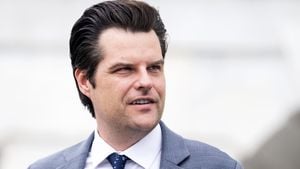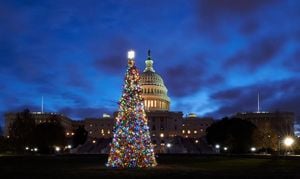Denver Mayor Mike Johnston has recently found himself under intense scrutiny due to his outspoken stance on immigration, especially against the backdrop of President Donald Trump’s incoming administration and its plans for mass deportations. Johnston gained national attention for his comments made during a recent interview, where he articulated his vision of resistance against federal immigration crackdowns and pledged to protect undocumented immigrants residing within the city.
The controversy sparked primarily from Johnston's assertive declarations during his interview with Denverite. He proposed utilizing the Denver Police Department (DPD) to physically intervene against any federal attempts to deport individuals within city limits. "More than us having DPD stationed at the county line to keep them out, you would have 50,000 Denverites there," said Johnston, likening potential protests to the iconic confrontation at Tiananmen Square—a comparison encompassing both the seriousness and the moral urgency he believes the situation demands.
This bold imagery of resistance has elicited strong reactions from both supporters and critics. Prominent figures such as Elon Musk responded swiftly on social media, claiming, "The mayor of Denver hates his constituents," aiming to undermine Johnston’s public support. This was echoed by former House Speaker Newt Gingrich, who criticized Johnston's remarks as potentially insurrectionist, threatening immediate repercussions from the federal government.
Facing this backlash, Johnston attempted to clarify his position during subsequent interviews, softening his earlier claims about the police actively blocking federal agents. Yet he held firm on his commitment to stand by the city’s immigrant community, not shying away from expressing his readiness to possibly face arrest for civil disobedience. "If our residents are having their rights violated, I would participate. And I would be comfortable being arrested," he stated, emphasizing his deep concern for the safety and rights of Denver’s undocumented population.
The question of legality surrounding Johnston’s approach arises amid uncertainties about federal law versus state and local authority. Legal experts assert the federal government holds the ultimate authority to enforce immigration laws. Yet, as constitutional law professor Sam Kamin noted, federal agents cannot compel states or cities to aid them without their consent. This nuanced legal framework leaves some room for cities like Denver to push back against federal initiatives without falling foul of the law.
While Johnston has closed ranks, bolstered by local advocates, the tone of criticism extends beyond social media vitriol. U.S. Senator Rand Paul suggested on Face the Nation this week the mayor might face significant political consequences if he does not comply with federal mandates. He portrayed Johnston's defiance as fundamentally misaligned with the principles of federalism, hinting at the possibility of removal from office for non-compliance.
During this time, Johnston has reiterated his commitment to upholding Denver’s sanctuary city laws—a designation intended to protect undocumented immigrants from federal deportation efforts. His administration is reportedly considering various strategies to inform and educate the immigrant community about their rights as fears mount over potential federal crackdown under Trump’s presidency. “If Donald Trump tries to break the law and abuse his power, he will get no help from us,” Johnston asserted, vowing to maximize legal protections for Denver's immigrant population.
Supporters of Johnston’s stance praise him for being on the right side of history amid what they see as oppressive governmental actions against vulnerable communities. Nicole Cervera Loy, who works with the Colorado Immigrant Rights Coalition, expressed optimism about Johnston's resistance, stating how important it is for leaders to stand up for the rights of immigrants facing deportation and other threats.
Despite the political friction, the reality for Denver residents remains fraught with uncertainty. Trump has publicly committed to using military resources to enforce his immigration policies, which may well step up the stakes for local entities attempting to provide sanctuary. Critics across the political spectrum have warned against empowering military forces to engage in immigration enforcement, citing longstanding principles separating civil law enforcement from military obligations.
Legal experts stress the importance of peaceful protests and community organizing as constitutional rights—actions which Johnston invites the residents to partake in should Trump’s administration move forward with mass deportations. Although he finds support from many, he remains cautious of how legally murky the ramifications could become, especially should those protests escalate or lead to clashes.
With heightened tensions and polarized opinions on immigration policy, the mayor’s leadership during this contentious time may set the stage for broader debates across other sanctuary cities. It's clear: Johnston's position could either reinforce the rights of undocumented individuals or spark broader legal challenges and political fallout as the battle over immigration policy at the local level continues to rage.
What happens next remains uncertain, but for now, Mayor Johnston stands resolute, believing he is advocating not just for the present, but for the dignity and future of many residents who fear for their homes and families. His stance might just be the litmus test for how cities navigate the impending challenges posed by the federal government’s aggressive stance on immigration.



